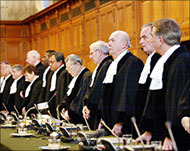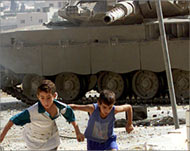Israeli courts fail to deliver justice
Israel’s army is continuing to use Palestinians as human shields, despite repeated attempts through the courts to ban the practice.

But Israel’s justice system is now coming under unprecedented international scrutiny, a fact that might afford Palestinians some hard-won legal victories.
The Supreme Court in Jerusalem has been presented with a series of legal petitions from Palestinian farmers and residents regarding the separation barrier in the past month.
They are claiming financial losses or separation from family members and emergency services caused by the route of the wall, which in many places cuts deep inside the Green Line, the border until 1967 between Israel and the West Bank.
The petitions came days before the International Court of Justice, sitting in The Hague, began its own deliberations on the legality of the wall on behalf of the United Nations General Assembly.
Despite a low profile abroad, the Israeli Supreme Court has been the only avenue of legal redress for Palestinians affected by the ever-tighter grip of the Israeli military on their lives.
So, how have Palestinians fared under Israeli justice during 37 years of occupation and, more especially, after more than three years of the Intifada? To what extent have their rights under the Fourth Geneva Conventions, to which Israel is a signatory, been protected?
Dismal record
According to one of Israel’s most prominent legal experts, the court’s record has been dismal.
 |
|
An Israeli child returns to his |
“The court has rationalised virtually all controversial actions of the Israeli authorities, especially those most problematic under principles of international humanitarian law,” says David Kretzmer, a law professor at Hebrew University and author of The Occupation of Justice.
Kretzmer points out court rulings have approved, among other things, the establishment of the settlements on occupied territory, the building of settler bypass roads on Palestinian land, changes to local laws, land confiscations, deportations, extra-judicial executions, house demolitions and administrative detentions.
In the scathing opinion of one senior human rights lawyer, who wished not to be named, Israel’s judiciary is happy to “rubber-stamp any war crime the army commits”.
Kretzmer observes access to the court does offer one small, if inadvertent, safeguard to Palestinians.
In cases where the government or army is acting in flagrant breach of either Israeli or international law, just the threat of legal action may be enough to reverse or modify their decision.
Bad publicity
The reason appears to have little to do with considerations of justice or humanitarian concerns.
In such cases, says Marwan Dalal, a lawyer for the Galilee-based Arab legal rights group Adalah, the authorities are more worried about the bad publicity that may follow in the wake of the case coming to court, or the fact that a ruling by the court in favour of the authorities may strain its reputation for delivering justice beyond endurance.
 |
|
The world court hearing on the |
Possibly that explains the Israeli government’s sudden, and very public, decision – days before the legal challenges against the wall reached both the courts in Israel and in The Hague last month – to shorten the route of the wall by 100km, bringing it closer to the Green Line.
Particularly controversial sections of the barrier are also being torn down before a verdict is delivered, including a section dividing two Palestinian towns – Baqa al-Gharbiya inside Israel and Baqa al-Sharqiya inside the West Bank – that were, before the creation of Israel, a single community.
In cases where the government or army can plausibly cite “security” concerns, there appear to be almost no legal safeguards for Palestinians.
Faulty arguments
When such cases reach the court, says Kretzmer, it invariably decides “in favour of the authorities, often on the basis of dubious legal arguments”.
During this Intifada, Palestinians and Israeli human rights groups have tried to mount legal challenges to some of the most oppressive aspects of the military occupation, including the system of checkpoints and roadblocks that have led to dozens of Palestinian deaths because medical treatment has been withheld, and the prolonged curfews imposed on most Palestinian cities.
Both the checkpoints and the curfews have suffocated Palestinian economic and social life and effectively developed into forms of collective punishment of the civilian population.
These measures have been sanctioned by the court, which has ruled that they are not “unreasonable” methods for the army to adopt – despite the fact that they appear to breach the Geneva Convention.
Human shields
But the most glaring example of the court failing to intervene, says Dalal, has involved the legal saga of the army’s use of human shields.
 |
|
Israeli soldiers detain |
He has been leading the fight for seven Israeli and Palestinian human rights groups demanding an end to this practice since May 2002. They believe it so clearly contravenes international law that it should be impossible for the court not to ban it. So far, despite several hearings, they have been proved wrong.
A spate of cases of Palestinians being taken hostage by the Israeli army, emerged in the wake of Israel’s first major invasion of the West Bank, in March 2002.
Individuals testified that they had been forced to enter buildings to probe them for booby-traps, to remove suspicious objects from the road, to stand inside military positions to deter fire from armed Palestinians or to walk in front of soldiers to protect them from gunfire.
An inferior life
“The policy simply assumes that the lives of Palestinian bystanders are inferior to those of soldiers,” says Dalal.
His view is supported by Amnesty International and Human Rights Watch, both of which classify the taking of human shields as a grave breach of the Fourth Geneva Convention.
None the less, over more than a year of hearings, the Supreme Court has refused to intervene.
|
“The policy simply assumes that the lives of Palestinian bystanders are inferior to those of soldiers” Marwan Dalal, |
Instead, it has repeatedly postponed hearings, allowed the army to redefine what constitutes its human shields policy and refused to issue contempt rulings when the army has been shown to act in bad faith.
In its original petition, Adalah submitted several testimonies of Palestinians used as human shields.
In one instance, on 8 April 2002, six Israeli soldiers were reported to have entered al-Baq mosque in the old city of Nablus, which was being used as an emergency hospital.
According to one of the doctors inside, Zahra al-Wawi, the soldiers arrived with their guns on the shoulders of Palestinian civilians.
Neighbours seized
These testimonies were supported by the accounts of ordinary soldiers.
One reserve sergeant, Nati Aharoni, told the army’s weekly newspaper Bamahaneh on 12 April 2002 of his experiences searching a building in Qalqilya.
“We had entered the building in the past and were afraid that this time the Palestinians might have left explosive devices for us,” he was quoted as saying.
“So, according to normal practice, the unit commander took a Palestinian from a neighbouring house and made him look through the place. Then we shook his hand and thanked him.”
 |
|
An Israeli soldier uses a mallet |
The army denied ever adopting such practices, although it promised to “clarify” for its commanders that Palestinians must not be forced to enter buildings unless the commander was sure they were not being put in danger.
The court agreed to these terms, despite Adalah’s objections that such decisions taken by soldiers on behalf of Palestinian civilians still violated international law and that commanders could not know whether civilians’ lives were being put in danger.
Injunction
The issue resurfaced in August 2002 when a 19-year-old Palestinian, Nidal Abu Muhsin, was shot dead by a gunman in the West Bank village of Tubas as he was forced by the army to knock on a neighbour’s door.
This time the army defended the practice under a different name: the “neighbour procedure”.
Apparently embarrassed by the death, the court issued a temporary injunction on the practice while the state provided more details.
But Adalah had to appeal to the court again in November 2002 after it became clear the army was continuing to use human shields in violation of the court injunction. The court again postponed acting, giving the state more time to reply to the claims.
In the meantime, in late December, Adalah and B’tselem presented a further four examples of Palestinians being used as human shields.
Gun battle
 |
|
Palestinian boys run away after |
In one case recorded by B’tselem, on 9 November 2002, 39-year-old Khalid Kamil, a father of three, was ordered at gunpoint to enter the home of an armed Islamic Jihad leader to call him to give himself up.
Kamil was later exposed to a vicious gun battle.
Rather than using the mass of evidence to justify contempt of court proceedings, the judges instead chose to reduce the scope of the injunction, in January 2003 approving a practice now relabelled “prior warning”.
The army agreed to apply two conditions: The commander must determine that the civilian was not placed in danger, and the participant must agree to help.
The judges rejected Adalah’s objections that all “assistance” to an army is inherently dangerous and that no Palestinian would volunteer for such an operation.
In February, April and May 2003, Adalah was back in court with more cases of Palestinians being used as human shields, including an incident photographed by an Israeli peace activist.
In one testimony, 21-year-old Samer Sharif from Nablus states that on 21 January 2003 he was put on the hood of a military truck, handcuffed to the window with his back to the driver.
The vehicle then drove towards stone-throwing Palestinian youths as one of the soldiers fired at them from behind Sharif’s head.
Consent issue
|
“There is well documented evidence that the army has been using Palestinians as human shields for at least two years in violation of international law” Marwan Dalal, |
Last summer, the court reconvened to hear a new submission from Adalah. This time the lawyers arrived with an affidavit from an Israeli soldier, Gedalia Etzion, aged 39, from Jerusalem.
According to Etzion, the issue of consent was treated as a joke by the commanders who explained “prior warning”. “One guy asked what we would do if the Palestinian did not agree to serve as a shield, to which the instructor answered – grinning and joking – ‘There is no such thing.'”
As for the other condition – that a civilian not be placed in danger – it was not mentioned at all.
The judges again postponed the case, this time to an unspecified date.
“There is well documented evidence that the army has been using Palestinians as human shields for at least two years in violation of international law and yet we are still waiting for the court to ban it,” said Dalal.
It is a verdict on the court that augurs ill for those hoping that Israeli justice will ease the suffering being imposed on ordinary Palestinians by the separation wall.